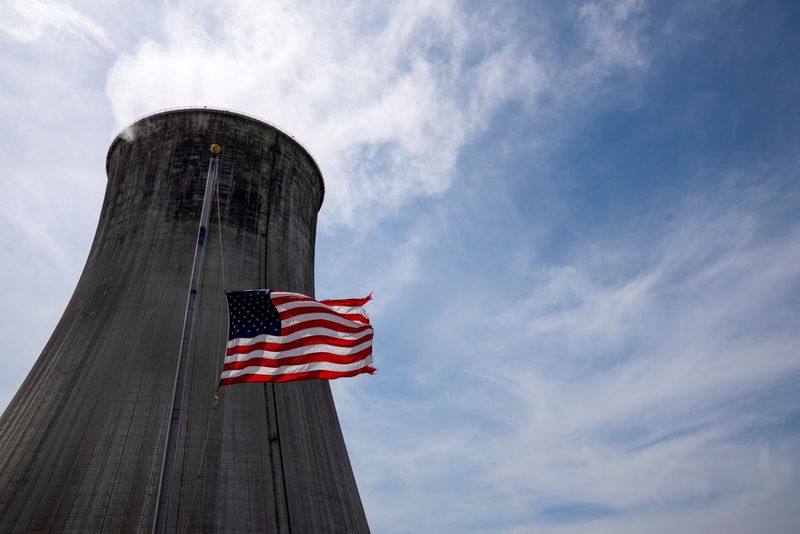By Valerie Volcovici
WASHINGTON (Reuters) -The U.S. Supreme Court's decision to limit the powers of the nation’s top environmental regulator to curb carbon emissions will force the Biden administration to take more creative measures to reach its ambitious goals to combat climate change.
The conservative court's 6-3 ruling restricted the Environmental Protection Agency's authority to regulate greenhouse gas emissions from existing coal- and gas-fired power plants under the Clean Air Act anti-pollution law.
That is bad news for U.S. President Joe Biden, a Democrat, who came into office with the aim of slashing power sector emissions to net zero by 2035, using the EPA as his key tool in doing so. The EPA has been working on a proposal to advance the decarbonization goal.
Eric Schaeffer, executive director of the Environmental Integrity Project and former EPA enforcement chief, said the Supreme Court decision will force “EPA back to drawing board.”
Without broad authority to carry out a nationwide shift from coal generation to cleaner sources like wind and solar, the EPA may focus on individual plants, setting new efficiency rates that could force the dirtiest plants to shutter.
The agency may also consider regulating greenhouse gases indirectly as a co-benefit of other air pollutant or water rules - a step that could face stiff legal challenges.
Targeting power plants with new tough standards for other pollutants or waste, for example, could require expensive retrofits that hasten the closure of old, inefficient coal plants.
Karen Sokol, a law professor at Loyola University New Orleans, agreed: “The agency is going to have to work around and dance around hitting carbon head-on, which is really the only meaningful way to respond to the climate crisis."
Biden said in a statement that his administration was reviewing the Supreme Court ruling and studying its options.
"While this decision risks damaging our nation’s ability to keep our air clean and combat climate change, I will not relent in using my lawful authorities to protect public health and tackle the climate crisis," he said.
There are currently no regulations in force to reduce carbon emissions from power plants, source of about a quarter of the nation’s greenhouse gases. The Obama-era Clean Power Plan was blocked by the Supreme Court in 2016 and a narrower replacement crafted by Republican former President Donald Trump's administration was blocked by a federal appeals court in 2021.
The high court decision did not affect EPA's ability to tackle greenhouse gas emissions from vehicles or methane from the oil and gas sector - a current focus of the agency.
LIFELINE FOR COAL?
With more constrained executive authority, the Biden administration’s options to tackle power industry emissions also include pursuing legislation in Congress - but that has proven a tough proposition given its partisan divisions.
The court decision affirms that "EPA and other agencies need explicit authorization to proceed in addressing major questions that have profound effects on the economy," said Jeff Holmstead, a former EPA official and partner at Bracewell.
Even so, carbon emissions from the power sector have dropped in recent years, as coal-fired power plants have been retired and replaced by cleaner-burning natural gas plants, and renewable sources like wind and solar.
That shift has been driven in part by a period of low gas prices, alongside declining costs and state and federal subsidies for renewable energy sources.
Surging prices for natural gas this year, however, have raised some concerns that utilities will switch to burning more coal, or extend the lives of coal plants, to save money. The prospect of light future EPA regulation could also boost coal.
"This is a lifeline to extending the use of coal," wrote Harvard environmental and administrative law professor Jody Freeman. "The shift to clean energy may happen more slowly as a result of the Court protecting the industry via this ruling."
The United States, behind only China in greenhouse gas emissions, is a pivotal player in global efforts to combat climate change. But without a clear plan to tackle emissions from the power sector, the Biden administration could face a credibility crisis on the global stage as it seeks to rally international ambition to fight global warming.
Biden's climate credentials have already been hit in recent months as his administration seeks to expand exports of liquefied natural gas to help Europe cut its dependence on Russian supply, and calls on the oil industry to pump up production to ease soaring consumer energy costs.

"U.S failure to deliver on its emissions reductions target will only worsen the pressures caused by the softening stance on fossil fuels,” said Yamide Dagnet, director of climate justice at Open Society Foundations, and former climate negotiator for the UK and EU.
The EPA said in a statement that it was reviewing the Supreme Court decision.